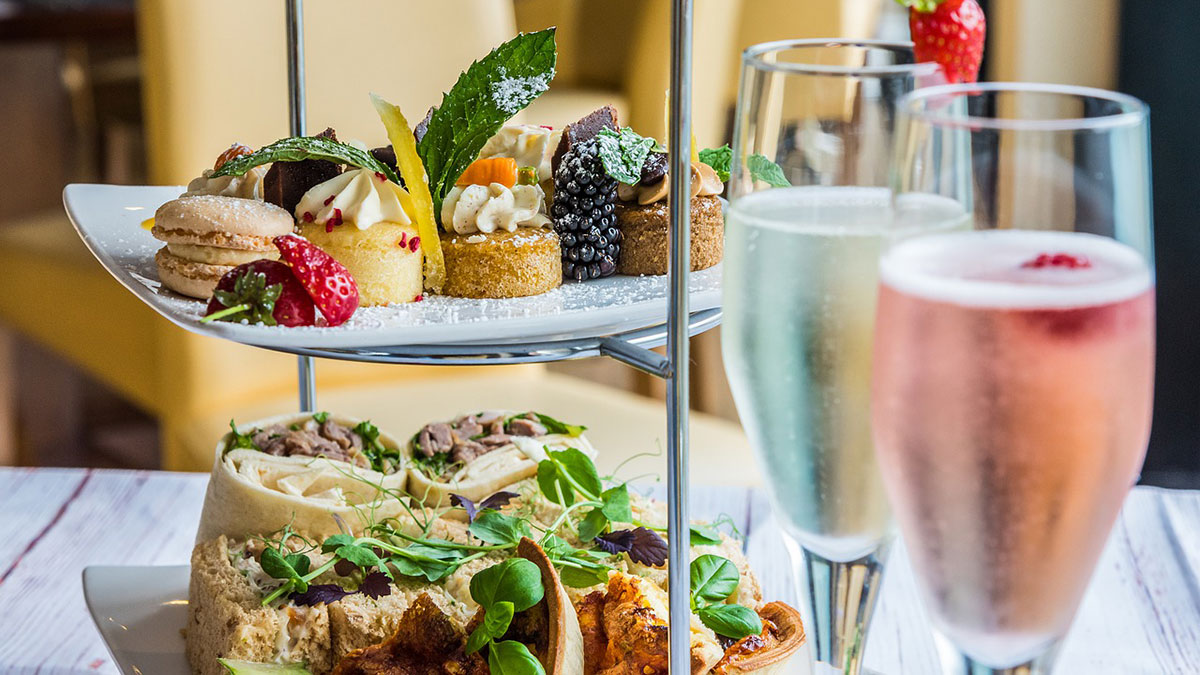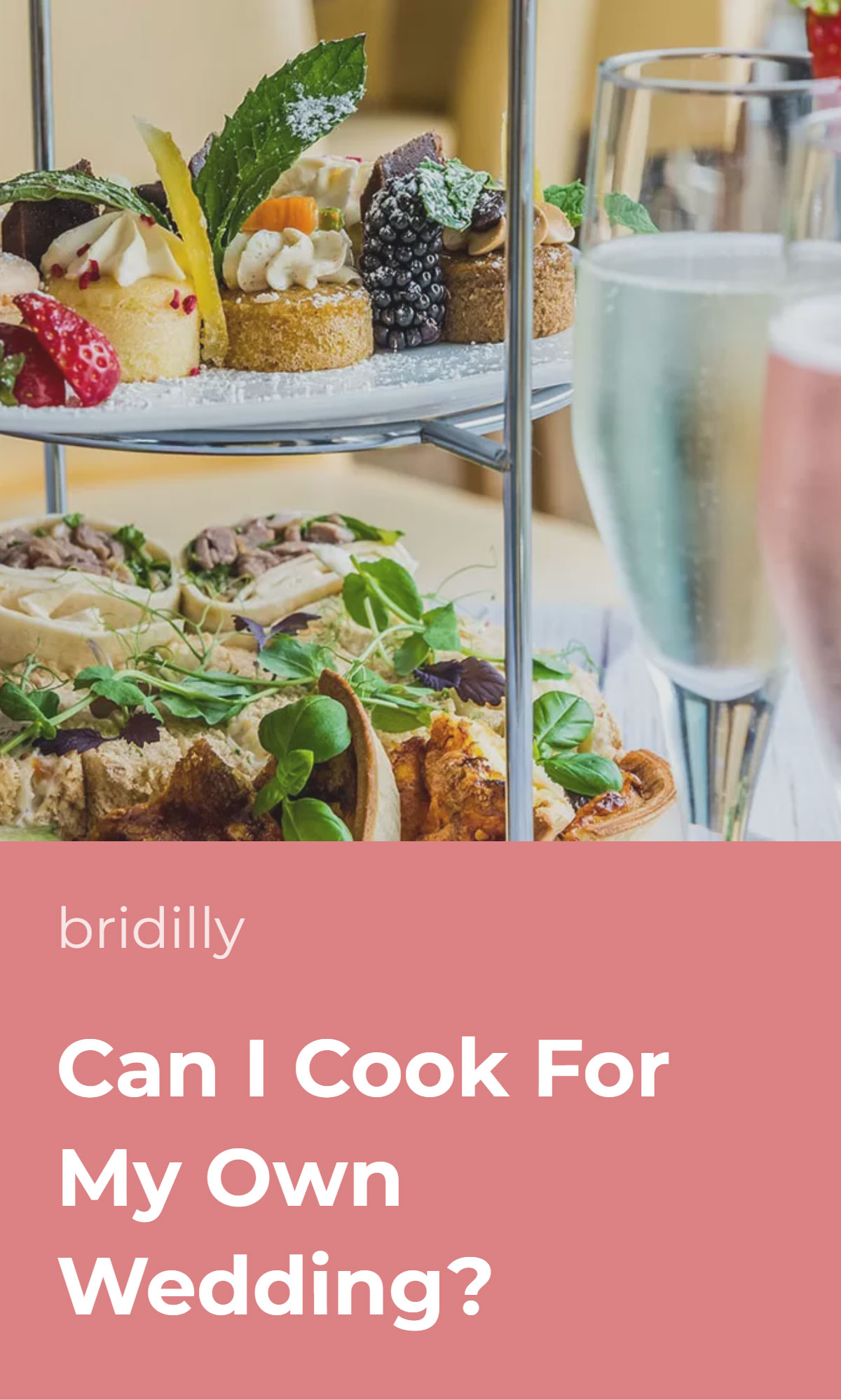Nowadays, many brides choose to self-cater their wedding. It’s a great way to showcase your cooking skills, have some fun, and make the event even more memorable.
However, cooking for your own wedding isn’t that simple.
Before opting for self-catering, you must consider numerous factors. It involves hours of planning, calculation, and evaluation.
In addition, you should have realistic expectations. Sometimes, ordering from a restaurant is a more effortless and cheaper option.
A DIY wedding requires smart budgeting and time management, excellent cooking skill, attention to safety guidelines, and a lot of research. You’ll likely need some help, too, unless you’ve only invited immediate family members.
Cooking, delivering, and serving food may add unnecessary stress to your special day. Often, the money saved on professional wedding catering is not worth the nerves and time drained.
You should only self-cater your wedding if you’ll truly enjoy it. The core objective of this day is to make both of you happy. There’s no need to sacrifice your peace of mind and time on something you don’t like.
Table of Contents [show]
Planning
It’s all about planning. Restaurants spend a lot of time planning the menu and calculating costs and time. When you decide to self-cater your wedding, all this falls on your shoulders.
Regarding wedding menu planning, stick with more straightforward options that don’t require heating and aren’t time-consuming.
Some easy dishes are just as tasty as sophisticated ones offered by restaurants. Choose dishes you’ve cooked multiple times before to ensure nothing goes wrong in the process.
Time management is crucial. It would be best to calculate how much time every dish takes to determine whether you’ll manage on your own or need help.
Cooking the night before the wedding reception isn’t the best idea either, as you need to sleep well before the event.
Plan your budget in advance. Don’t simply go to the nearest store to buy all the ingredients. Instead, find out which stores have the best prices on bulk purchases.
Planning doesn’t end with the menu and budget, though. First, it would be best to find out whether your wedding venue has a kitchen you can rent.
Although you’ll prepare most of the food at home, it must be stored in a refrigerator, heated, and served. If a kitchen is unavailable for rent, you’ll need to change the plan.
It would help if you also considered utensil availability, delivery options, and who will clean the dishes after the event.
Number of Guests
Self-catering isn’t an option for any wedding. Cooking for 20 guests may be fun, but cooking for 300 guests is impossible unless you’re Wonder Woman.
There’s no definite number of guests that is considered too many for self-catering, of course. Each bride should assess her skills, time, and resource availability individually.
If you’re a professional cook and have great friends with a few extra hands to help, even a dinner for 100 may not be an issue.
However, it’s crucial to understand that a high number of guests may be a problem not only due to the time required for cooking.
You’ll also need a larger kitchen, which refers not only to worktops but also to the oven and stove. Restaurants typically have either industrial, large appliances or multiple ones. Your home oven won’t fit 50 portions at once.
Self-catering for many guests may also end up more expensive than ordering food. That’s because restaurants buy ingredients in bulk, often from their own suppliers.
Time
Cooking is time-consuming, even if you’re making dinner for two. Now, imagine that you must cook ten, twenty, hundred times more portions. You’ll need accurate time planning and, preferably, some help.
Food must be fresh. You’ll have plenty of other things to worry about, so cooking right before the wedding is burdensome. The best time for cooking is one or two days before the reception.
Sticking to simple recipes can save you plenty of time. However, even the preparation of regular sandwiches involves a lot of cutting and serving.
Serving food during the event also takes time, and you certainly shouldn’t run around with plates in a white dress yourself. Instead, ask a friend or a family member to help you.
Your Skills
Our cooking is always tasty for our loved ones, but it may still not be comparable to the cuisine of the best chefs.
Therefore, it’s best to opt for dishes you cook often and are good at making instead of testing out new sophisticated recipes. Plus, you must follow all safety guidelines strictly.
Even if you’re a cooking genius, your preparation speed may not be sufficient. The time indicated on recipes found on the web or in cooking books is an estimate for a skilled chef.
Beginners usually spend two or three times more time on the same recipes.
Nice serving also requires skill. For example, folding napkins and correctly locating ten utensils is much more complicated than it seems.
Don’t have overly high expectations. Professional chefs spend years learning cooking, and you don’t have to be just as good at it. But evaluating your skills in advance helps to avoid disappointment afterward.
Delivery
Cooking is only the start of a self-catering journey. It would help if you considered how to deliver food to the wedding venue in advance. That’s a rather tricky part, especially if the wedding is large and the venue is far away.
Firstly, food must stay fresh. Keeping it cool in 90-degree Fahrenheit heat is challenging. You’ll need fridge bags, likely multiple, that aren’t cheap. Find out in advance whether you can rent some.
Secondly, you should transport the food without squishing or spilling it. Transporting food requires good packing and gentle handling.
Apart from food, you may also need some space in your car for dishes and utensils. Plus, your wedding dress skirt will likely use up half of your vehicle space.
You may have to ask friends for help in bringing the food to the venue. Another option is to find a delivery service.
Serving
You’ve cooked and delivered the food to the wedding venue. These steps are essential, but the guests don’t see them. Guests will judge your efforts only based on how you serve the food during the wedding reception.
Food must be of the correct temperature. Ensure that there’s enough place in the fridge to keep cold foods cool until you serve them.
On the opposite, you must heat some meals. The venue must have a large enough oven or multiple ones to heat all portions at once. You can’t serve the wedding dinner to guests with a half-hour difference.
Then, there’s the visual part of serving. The dish and utensil placement must follow etiquette rules and be stylish. An appealing table decoration can make your food seem even more delicious.
However, nice serving requires time. The morning before the wedding is usually spent on dressing and doing makeup, not folding napkins.
Ask your best friends or mom to do it for you, but keep in mind that they want to get ready, too.
Cleaning Up
This step often gets neglected, but self-catering the wedding isn’t over when you serve the food and guests eat.
After the event, you’ll need to clean everything up. The cleanup involves getting rid of leftovers and washing the dishes.
Most couples want to relax after a happy yet stressful day. Others go right to honeymoon vacation.
Either way, washing dishes likely isn’t the dream ending of your wedding. Instead, it has some alternative-ending Cinderella vibes.
It would be best if you had a plan for your leftovers and cleaning. You may give the food to guests to enjoy for breakfast, bring everything home, or donate it. Any of these options require you to bring along as many containers as possible.
As for the cleaning, find out whether a dishwasher is available at the venue. If it isn’t, you may have to bring the dirty dishes home.
Alternatively, you could hire a cleaning service. That’s a reasonable expenditure for such an event.
Extra Stress
A wedding is an undoubtedly happy event, but all the planning and preparation can be highly stressful. Even if you aren’t self-catering, you have plenty of points to think about and organize.
Your to-do list includes finding and altering a wedding dress, renting a venue, sending invitations, and hiring musicians and photographers.
The stress typically intensifies the closer the wedding day is. A month before the event, you can relaxedly shop for a wedding dress drinking champagne.
But hours before the event, you’ll likely be tying your corset in a hurry and doing makeup.
Consider whether you want to add cooking, delivery, and serving food to an already nervous day. After all, it’s your special day, and you should feel like a princess, not the princess’s maid.
Safety Precautions
Restaurants place great importance on food safety, and you should too.
Indeed, while food poisoning will undoubtedly make your wedding memorable, that’s not the kind of “memorable” you wish it to be.
There’s no need to acquire a food safety certification, but you must follow certain cooking safety precautions. First, take the temperature of everyone who’s helping you to cook and handle the food.
If it’s even slightly higher than the norm, kindly request them to rest up and find someone else to help. It may be their normal temperature, but you shouldn’t risk it.
Limit the number of people handling the food. So much help is excellent, but it leads to higher risks. Professional wedding caterers, on the other hand, hold all the necessary safety qualifications.
Ensure that food is stored and transported at a suitable temperature to avoid it spoiling. Don’t prepare meals too long in advance.
Finally, keep your hands clean or use gloves and request your helpers to do the same.













No Comments Add one
Leave a Comment